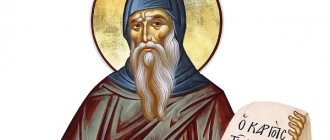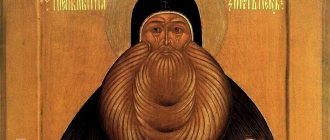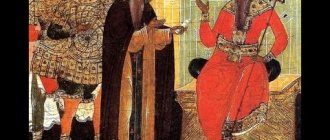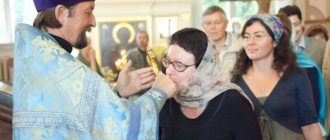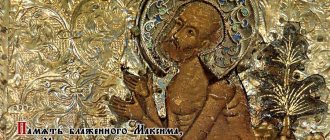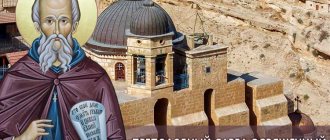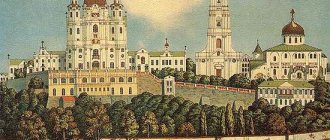February 3 (January 21, Old Style) The church honors the memory of St. Maxim the Greek , one of the most famous saints among the Old Believers. The life of St. Maxim stands apart, as it were, in comparison with other hagiographies: here, in contrast to the traditional tale of the ascetic exploits of Russian monastic hermits and desert dwellers, we see a description of an unyielding moral struggle, as well as a special feat of patience in exile and severe hardships, for the sake of confession truth.
Life of St. Maximus the Greek
The Monk Maxim (in the world Michael Trivolis) was born in 1470 in the Greek city of Arta, he was the son of a wealthy dignitary and received an excellent education. In his youth he traveled a lot and studied languages and sciences in European countries; visited Paris, Venice, and Florence, where he was deeply impressed by the sermons of the Dominican monk and abbot of the monastery of San Marco in Florence, Girolamo Savonarola, who was later brutally executed by Catholic inquisitors. Secular vanity and worldly temptations did not seduce the reverend’s God-loving soul; after returning to his homeland, he, presumably in 1505, went to Athos and took monastic vows at the Vatopedi monastery.
Quietly and serenely leading a pious hermit life, the Monk Maximus for several years enthusiastically studied the ancient Athonite manuscripts, which were left behind by the Greek emperors Andronikos Palaiologos and John Kantakouzenos, who accepted monasticism. But after some time, a decisive change took place in his life, forever tearing the monk away from his native land and silent desert life.
In 1515, the Grand Duke of Moscow Vasily Ioannovich (1505-1533) wanted to understand the Greek manuscripts and books of his mother, Sophia Paleologus, and turned to the Patriarch of Constantinople with a request to send him a Greek scholar. At first, the choice fell on the Athonite monk Sava from the same Vatopedi monastery, but the latter was so old that they decided to send the energetic and relatively young Maxim the Greek instead.
In 1518, the monk arrived at the new place and was greeted with great honor. They settled the learned monk in the famous Chudov Monastery. Maxim's first major work was the translation of the Explanatory Psalter together with Russian translators and scribes Dmitry Gerasimov and Vlas Ignatov, which was approved by the Russian clergy and the Grand Duke. However, even then Maxim asked permission to return back to his beloved abode. But Grand Duke Vasily III rejected his request, and Maxim had to continue working on the books. He also wrote letters against Mohammedans, papism, and pagans. He translated interpretations into the book of the Acts of the Apostles, interpretations of St. John Chrysostom into the Gospels of Matthew and John, and wrote several of his own works.
Speaking about the church and theological works of the Monk Maxim, one cannot ignore his closest friend and like-minded person - the monk prince Vassian Patrikeev. The learned monastic associates had close cooperation and complete unanimity among themselves on many difficult and pressing issues for Russian society. They worked together to correct church books, both were ready to, regardless of their faces, expose human untruths, for which they were betrayed, each in their time, to an unjust trial and severe imprisonment.
Metropolitan Varlaam of Moscow (1511-1521), who initially met the learned Athonite monk, highly valued his work. When, according to the will of the Grand Duke, he was forced to leave the department and retire, and the Moscow throne was taken by Metropolitan Daniil Ryazanets (1522-1539), the situation changed dramatically. The reason for the general displeasure seemed to have a very insignificant reason: the new metropolitan demanded that the Monk Maxim translate the church history of Theodoret into Slavic, but he decisively refused this order, pointing out that “this history includes the letters of the schismatic Arius, and this can be dangerous to simplicity.” This gave the metropolitan a reason to reproach him for “disobedience,” but the real contradictions were much deeper and concerned, first of all, the debatable church issue regarding monastic land ownership.
The Monk Maxim was a convinced follower of the “non-covetous” movement, whose spiritual leader at that time was the monastic prince Vassian Patrikeev. The experience of Athos had special significance for the ideologists of “non-acquisitiveness.” “All the monasteries without estates, without villages, live only by their handicrafts and incessant labors and by the sweat of their brow they earn for themselves all the things of this life,” wrote the saint. Maxim about the statutory order of the Athonite monks. Having compared the Slavic text of the Nomocanon with the Greek original, Maxim discovered that the mention of monastic villages appeared at some stage of the Slavic tradition; it was absent in the original Greek text. According to the firm conviction of the monk, monasteries could only have small plots of land for subsistence with their own labor, but in no case should they take ownership of peasant settlements, for this was inevitably associated with great worldly vanity and trouble, leading to the disruption of the entire monastic order.
The general ideological direction of the “non-possessors” is most clearly stated in the “Response Word,” which was written by Elder Vassian:
“The Lord commands: “And I will give to the poor.” But we, overcome by love of money and hunger, our wretched brethren living in our villages, offend them in various ways, by torturing them with unrighteousness, offending them, and inflicting flattery upon flattery and usury upon usury upon them, but we show mercy to them nowhere, but we can never help them. give away the surplus from their estates naked without mercy, take away their cow and horse, and drive away Samech with their wives and children far from their borders, like the bad ones; You betray some of them to the princely power, to ultimate extermination as a forgery. And even if we are commanded to give away ours to the poor, even if we practice virtue, we will, as if we hate our own souls and take up arms against the commandments of the Lord, we offend and rob, we sell out Christians, our brethren, and we torture them with a scourge without mercy, like wild beasts jumping on their bodies.”
Metropolitan Daniel, beloved student of St. Joseph of Volotsky, on the contrary, was a staunch follower of his teacher, who wrote a lot in defense of the rich monastic inheritances. Some facts of his biography are surprising. The exact date of his birth is unknown, the most authoritative sources point to 1492. In 1513-14 he was accepted into the Joseph-Volokolamsk monastery, and already in 1515, i.e. a twenty-three-year-old youth, took the place of the deceased St. Joseph, at the insistence of the Grand Duke himself and in accordance with the will of his teacher. Seven years later, that is, in the thirtieth year of his life (according to another version, at thirty-seven years old), Daniel becomes the all-powerful Metropolitan of Moscow and the right hand of the Grand Duke, on whom he could completely rely in all the complex church and moral problems of that time.
Contemporaries did not like the new metropolitan, considering him too servile to the secular authorities. So, contrary to church rules and the commandments of Christian morality, he agreed to issue a forged “metropolitan letter of protection” to the Grand Duke’s longtime enemy, Vasily Shemyachich, who, however, upon arrival in Moscow was immediately captured and put in prison, where he ended his days. This whole story caused a storm of indignation in Russian society. The next case was even more indicative of the moral qualities of the young metropolitan, who soon became the chief judge-prosecutor of the Monk Maximus the Greek.
In 1525, the Grand Duke, due to the infertility of his first wife, Salomonia Saburova, decided to dissolve this marriage in order to marry a second time to a young beauty - the Lithuanian princess Elena Glinskaya, the future mother of Tsar Ivan the Terrible. Metropolitan Daniel, contrary to the opinion of all other patriarchs, gave his blessing for the divorce and re-wedding. Then the brave confessor Maxim sent the prince “Instructive Chapters to the Leaders of the Faithful,” in which he convincingly proved that the situation obliges the prince not to submit to animal passions. The Grand Duke could not tolerate such harsh denunciations and ordered a Local Council to be convened to study in detail the church writings of St. Maxim. The main reason for his conviction of “heresy” was some inaccuracies in his first translations, which at that time were associated with insufficient knowledge of the Russian language. No arguments or objections to the justification were accepted; Maxim was found guilty and exiled to the monastery dungeon of the Joseph-Volokolamsk Monastery. The sufferer spent six years there in incredibly difficult conditions: he was locked in a damp, cramped and stinking cell, where he suffered numerous torments from smoke, cold and hunger. These were the most difficult years of his life. He was excommunicated from church services and communion, prohibited from having any contacts and writing books. But the Lord Himself did not abandon the innocent sufferer: one day a luminous Angel appeared to him and said: “Be patient, old man! With these torments you will be freed from eternal torment.” Imprisoned in a prison cell, the venerable elder wrote here with charcoal on the wall a canon to the Holy Spirit, which is still read in the Church: “Who fed Israel with manna in the desert of old, and fill my soul, O Lord, with the All-Holy Spirit, so that I may serve You with pleasure in Him.” ..."
In 1531, a secondary council was convened to condemn the “non-possessors.” This time Elder Vassian Patrikeev received a more severe punishment: he was also found guilty of certain heresies and was sent to a monastery prison, in the place of St. Maximus. But the monk himself, thanks to the intercession of the Eastern patriarchs, received some relief: he was sent to the Tver Otroch Monastery under the supervision of the Tver Bishop Akaki, who respected him greatly and provided him with the opportunity to read and write. Nevertheless, the church ban remained in force. In vain did the venerable elder (at that time Maxim was already in his seventh decade) beg to forgive his involuntary mistakes and let him go back to Athos, or at least lift the excommunication from communion. The death of the Grand Duke in 1534 did not change his position at all, since Metropolitan Daniel remained adamant in his decision. At this time, the monk composed an autobiographical work, “Thoughts with which a sorrowful monk, imprisoned, consoled himself and strengthened himself in patience.” Here he wrote in particular: “Do not grieve, do not grieve, do not grieve, dear soul, that you are suffering without truth, from which it would behoove you to receive all the good, for you used them spiritually, offering them a meal filled with the Holy Spirit... »
In 1538, the high patron of Metropolitan Daniel, the thirty-year-old widow of the Grand Duke Elena Glinskaya, suddenly died, and in 1539 he was deposed by the Shuisky princes and removed to the Joseph-Volokolamsk monastery, where he spent his last years in complete obscurity. Characterizing the activities of Metropolitan Daniel in general, Professor E. Golubinsky wrote the following:
“Metropolitan Daniel, as a moral person, is far from a bright person. But the same Metropolitan Daniel occupies a completely outstanding position among our other metropolitans as a teacher, not in deed, but in the written word. He wrote not two or three teachings, like other metropolitans, but a whole large book of teaching words and the same book of teaching messages.” It is known, in particular, that he revised a number of texts of a philosophical and philological nature that were part of the Old Russian literary tradition, including the Prologue of John the Exarch, the Definition of the Philosophy of Constantine-Cyril, as well as the “Accurate Exposition of the Orthodox Faith,” or Theology of John of Damascus.
In 1551 or 1547, after repeated appeals from the Eastern Patriarchs and Metropolitan Macarius, Maxim the Greek was transferred to rest in the Trinity-Sergius Monastery and the church ban was lifted from him. Saint Macarius, who deeply revered the holy elder during his lifetime, introduced part of his teachings into the Great Chetya Menaion. The Monk Maxim the Greek left behind numerous works of a varied nature: theological, apologetic, spiritual and moral; In addition, messages and letters to private individuals have been preserved from Maxim. Already since the 16th century, his works have been distributed in numerous handwritten copies, some of them are stored in the library of the Trinity-Sergius Lavra; In total, the monk wrote up to 365 texts.
In the 17th century, during the period of Church reform, disputes flared up around the theological writings of Maximus the Greek between supporters and opponents of innovations: in order to denigrate the ancient rites, the reformers declared two of the saint’s works forgery, where he wrote about double-fingeredness and special alleluia. Historians Golubinsky and Kapterev convincingly refuted this point of view, but these two works of Maxim were not included in pre-revolutionary printed publications for censorship reasons.
Joseph Volotsky
The ideological leader of the Josephites, Joseph Volotsky (in the world Ivan Sanin, d. 1515), came from the nobles of the Volotsk land. Even in his youth, he took monastic vows at the Pafnutyevo-Borovsky Monastery, and after the death of the first abbot he became its new abbot. Soon, however, Joseph had to leave Borovsk. The reason for this unusual decision was the conflict between the abbot of the monastery and Grand Duke Ivan III. The decisive factor was Joseph’s fear that his personal conflict with the prince could negatively affect the high priest’s attitude towards the entire monastery.
Obviously, fearing a new manifestation of the policy of secularization of church lands pursued in those years by Ivan III, the former rector left the possessions of the Moscow prince to his younger brother Boris Volotsky. Here he founded a new monastery of the Dormition of the Mother of God, which is usually called St. Joseph of Volokolamsk after the name of its abbot. The beginning of monastic life in the new monastery coincided with the rise of the North Russian heresy, which was reflected in the charter. An early statement of the rules of monastic life, compiled by Joseph of Volotsky at the beginning of the 15th century, prescribed a complete ban on any personal property for monks, who were not even allowed to have their own icons and books. The entire order of monastic life was strictly distributed and regulated. Thus, the center of monastic life was the temple, where, therefore, precious utensils, rich paintings and decorations were allowed. Not only monetary and in-kind donations, but also income from monastic lands and villages were prescribed as sources of existence for the monastery [2, pp. 196-197].
Prot. Georgy Florovsky wrote that the truth of Joseph Volotsky is, first of all, the truth of social service, and his ideal is a kind of “going to the people.” From Joseph's point of view, all members of society must perform a certain service. Even the king himself is no exception. And he is included in the same system of the Lord’s requirements - the king is legal, and only within the limits of God’s law and commandments does he have power. But an unjust or “hard-hearted” king cannot be obeyed, he is not a king: “Such a king is not God’s servant, but the devil, and not a king, but a destroyer.” In this system, monastic life is also a kind of social burden, a special type of religious-earthly service. In the case of Joseph, the actual ministry of prayer is subordinated to this social ministry, acts of justice and mercy from within. He protects the monastic villages, one might say, for philanthropic and social reasons: he takes them away from the rich and powerful in order to give and bestow them on the poor and needy. The Volokolamsk Monastery is constantly being transformed, on the initiative of the abbot, either into an almshouse, or into a charity canteen for orphans and the poor, or into a hospital [1].
At the beginning of 1500, significant changes occurred in the relationship between Joseph of Volotsk and the Grand Duke. At this time, Ivan the 3rd abandoned his previous intentions to transfer church lands into princely possession; in 1504 there was also a final condemnation of the Moscow group of heretics, in favor of which the Abbot spoke in his writings. A few years later, in 1507, a conflict arose between the abbot and the son of his former patron, Fyodor Borisovich Volotsky, who seized part of the monastery property. As a result, the abbot of Volotsk managed to take the monastery under his personal protection. Subsequently, Joseph became a staunch supporter of the power of the Grand Duke, and his monastery became a place of exile for many subsequent church leaders, whose loyalty the authorities had reason to doubt: both Vasily Patrikeev and Maxim the Greek visited the monastery.
Miracles and veneration of St. Maximus the Greek
The Monk Maxim the Greek reposed on the day of remembrance of his heavenly patron, the Venerable Maxim the Confessor. He was buried in the Trinity Monastery, near the northwestern wall of the temple in the name of the descent of the Holy Spirit on the apostles (Holy Spiritual). In 1561, the first miracles happened at the tomb of the saint - the spiritual insight of a certain pilgrim and cell attendant of the cathedral elder Vassian John. It became part of the legends of the Trinity-Sergius Lavra. There are also many other manifestations of grace attested that took place at the tomb of the saint, on which the troparion and kontakion to him are written. The Monk Maximus the Greek is also venerated as a saint in the Churches of Constantinople and Greece. The face of St. Maxim is often depicted on the icon of the Council of Radonezh Saints.
Among the Old Believers, St. Maxim the Greek has always enjoyed wide authority as a learned monk who theologically affirms the truth of the Old Orthodox rites: double-fingering, special alleluia, etc. His works are pointed out, in particular, by such outstanding figures of the Old Believers as St. svschmch. Avvakum and the famous writer-apologist (“apostle of the Belokrinitsky hierarchy”) F. E. Melnikov. Local veneration of the saint followed almost immediately after his death. His holy relics are glorified by incorruption and miracles and are now open for veneration in the Assumption Cathedral of the Holy Trinity Lavra.
Cancer with the relics of Maxim the Greek. Assumption Cathedral, Trinity Lavra of St. Sergius
Proceedings
Maxim Grek translated books such as:
- "Acts of the Apostles";
- "Collection of church canons";
- John Chrysostom's comments on the Gospel of Matthew and John;
- books of Ezra;
- excerpts from the books of Esther and Daniel;
- several works of Symeon Metaphrastus.
Selected works of St. Maximus the Greek
Reverend Maxim the Greek. Iconography
In numerous lists of works and translations of Maxim the Greek in the 16th, 17th and 18th centuries. His images are often found. Usually these are miniatures representing an elderly man in monastic clothes, with a wide and long beard, most often in profile, shoulder-length, sometimes waist-length, sometimes full-length, sometimes with writing instruments, copying books. However, these conventional “portraits” of Maxim the Greek did not remain his only images. It is difficult to name any other figure of ancient Russian writing and literature, whose depiction would have received as much attention in the 16th - 18th centuries. Here are miniatures in handwritten books, and numerous icons, distinguished by a variety of iconographic prototypes, and, finally, frescoes decorating the walls of cathedrals and churches. With all the richness of this material, it is easy to notice the difference between those images of Maxim the Greek, in which he is presented as a writer, publicist, thinker, and others, in which he was given the significance of a saint, emphasizing this not only with a halo around his head, but also with the inscription “Reverend Maxim Greek".
Maxim Grek. Miniature and beginning of the dogmatic work “Confession of the Orthodox Faith” in the collection of works by Maxim the Greek. XVIII century
Reverend Maxim the Greek. Icon
Reverend Maxim. Icon. Russia. XVIII century CAC MDA
Reverend Maxim the Greek. Icon. Russian North. End of the 18th century
Undoubtedly, the earliest of all his images that have reached us are three drawings in the lists of his works in the Solovetsky collection. They are usually dated to the end of the 16th - beginning of the 17th century. If these are not lifetime images of Maxim the Greek, then in any case they go back to some unknown stable prototype, which conveys not only the generally monastic appearance of Maxim the Greek, in profile, with a beard, in a hood, but also his individual features: curved down a hooked nose, sharp folds on the cheeks, below the cheekbones, a luxuriantly growing beard.
Reverend Maxim the Greek. Mid-18th century, Pomorie
The fact that Maxim the Greek’s contemporaries looked at him primarily as a writer and thinker can be judged by the already mentioned image of him on the frescoes of 1564, just 8 years after his death, in the gallery of the Annunciation Cathedral of the Moscow Kremlin. Thus, the first stage in the history of the image of Maxim the Greek consists of his conditional “portraits” as the author of numerous works and translations created by him during his almost forty years (1518-1556) stay in Rus'.
Reverend Maxim the Greek. Icon
It is extremely interesting that many of his demands, expressed by him in various literary works, were adopted at the Stoglavy Council. All this shows us Maxim the Greek as an intelligent, courageous and sharp-minded writer and publicist, who with firm conviction defended his views, which were formed in the struggle between the “non-possessors” and the “Josephites.” Possessing the remarkable temperament of a publicist, Maxim the Greek was a bright, albeit somewhat tragic, figure in Russian culture of the 16th century.
Righteous John Fedorov, Rev. Maxim the Greek, Rev. Andrei Rublev
Metropolitan Daniel
Metropolitan (1522-1539) Daniel (second half of the 15th century - 1547) was a zealous ideologist of the Josephites. He was a direct, although not very close (and not the most popular) student of Joseph, and in his works one can find direct features of imitation of the writings of the Volokolamsk abbot.
Metropolitan Daniel is known as the author of numerous words and teachings. According to the traditional outline of works of oratorical prose, each of these words consists of three parts, but these parts are very unusual. The first part contains an explanation of the main content, the second contains quotations from Scripture and sacred works to illustrate and support the author’s thoughts, the third part - “punishment” - consists of moral imperatives arising from the basic provisions of the word. A.A. Zimin noted that each of Metropolitan Daniel’s words is more of a scientific treatise than an edification.
A.A. Zimin believed that the recipients of Daniel’s sermons were mainly young Josephite preachers. Daniel believed that people should listen carefully to the instructions of preachers and not philosophize themselves. He actively fought against the spread of heretical freethinking and tried to provide theological justification for a number of dogmas of the Orthodox Church. Thus, two words of the Metropolitan are devoted to the question of the Incarnation of Christ and the redemption of man from original sin. The eleventh word of Daniel is devoted to the condemnation of astrologers: Daniel defends the idea of \u200b\u200bthe omnipotence of God's providence and the impossibility of a sinful and imperfect person to know divine decrees; in this situation, no stars can predict the fate of a person.
Daniel did not ignore the popular and relevant theme of the relationship between man and government in the 16th century. In Word 8 he speaks of the need to obey “authorities.” Researchers note that it is not for nothing that it is not specified here what kind of power, spiritual or secular, is being discussed: Daniel speaks of obedience to authority in general and prohibits resistance to any authority. Following Joseph Volotsky, Daniel interpreted the king as a servant of God, but chose to remain silent about the “king of torture,” only drawing attention to the fact that “it is worthy and fair to honor kings.” Moreover, in one of his letters addressed to a man who had fallen out of favor, Daniel calls on the addressee to submit to the king and trust in God.
Daniel condemned various vices of people. He sharply condemned the addiction to buffoon games, after fashion. In one of his statements, he vividly describes the image of a fashion king who shaves his hair and wears “boots full of devils and small in size.” The Metropolitan does not approve of falconry. In the 15th word, he exclaims bitterly: “Everything that is carnal love, everything that is sinful and lawless, is joyful, everything on earth wants to live.”
Both Daniel’s accusatory manner and his special “rude” style - an abundance of derogatory epithets and comparisons - go back to Joseph. But the goals of his denunciations were different: Joseph, in the first period of his activity, sometimes dared to denounce even very influential opponents, metropolitans and even the Grand Duke himself; but Daniel's denunciations were always directed from top to bottom, against one or another member of his flock. Because of this feature of Daniel's denunciations, they deal much more strongly with themes of everyday life. Daniel’s writings are dominated not so much by polemical as by edifying and expressive moments, with the help of which he tries to convince his listeners. Daniel's preaching words are characterized by freedom and boldness in the use of language, extensive use of vernacular and details of everyday life. When he denounces vices, he focuses not on the psychology of their carriers, but on depicting their behavior.
Moral teachings of St. Maximus the Greek
Why, my dear soul, do we indecently consign to oblivion the glory and bliss of the heavenly crowns with which Christ, the King of all, promises to crown those who courageously resist their bodiless enemies? Why do we not keep in our minds the divine purpose for which we were created by God in His image, but like animals alien to reason, we spend the entire time of our lives pleasing the belly? Why, having been created to inherit heavenly blessings, do we senselessly, O soul, hold on to earthly ones? I am the image of God: accordingly, we must philosophize in order to acquire primitive kindness. But know that you then act in accordance with your Prototype, with which you must have real similarity, when you diligently, even until your last breath, direct your life according to his Divine commandments; when you remove yourself far from submission to the passionate desires of the flesh; when you root out every lie, flattering disposition and destructive envy from your heart; Let us love the truth, right reason, holy kindness and holy life in everything. Otherwise, let no one call himself the image of God unless he has acquired in himself all the beauties of the Prototype.
We were created on earth to be guardians of immortal beauty and participants in God's secret conversations. Let us recognize, soul, the height of our glory and let us not senselessly liken ourselves to dumb animals. The end will not be the same for us and for them, O soul, just as the image is not the same for both. They tend to always bend down and constantly fill their wombs with earthly growths; With us, the soul and the very appearance of the body are beautifully designed by the wise Artist. I will not talk about your other god-like beauties, with which you are very magnificently adorned: they sufficiently convince us that our fatherland is heaven, and that we can boast that we have the Most High God as our Father. Therefore, we will always try to direct our minds to grief, where our Father and our residence are. The Most High calls us His sons: then why are we, as humans, dishonorably expelled from this (divine) life (Ps. 82:6-7)? Let us glorify the Most High on earth, so that He too may adorn us with heavenly crowns. Let us glorify the Most High with all our hearts by the righteous and immaculate keeping of His commandments; let us take hold of eternal life. Let us hate with all our hearts everything base and throw away from ourselves the yoke of enslavement to passions. Let us stand on the firmament of high freedom, on the firmament of godlike freedom, with which you were enriched before you fell into the power of the destructive demon, when, having lost your immortal glory, you became like senseless cattle (Ps. 49:21). You, face to face, boldly enjoyed the divine conversations of your Creator: try to enter this glory again with the godly morals of true piety (Word 1, very soul-helping for those who listen to it. The mind speaks to the soul; here also against covetousness).
The Holy and Reverend Fathers composed many different prayers, and they all have one content and one purpose: with them we confess to the Lord of all the sins we have committed before and ask for forgiveness for ourselves and so that we can leave them behind and be strengthened in the future by the fear of the Lord, and to live pleasingly before Him, according to His holy commandments, and those who have reached perfection and have come to the measure of the age of Christ, as the Apostle says: “until we attain all things to the union of faith and the knowledge of the Son of God, to a perfect man, to the measure of the age of the fulfillment of Christ” ( Eph.4:13), - they ask to receive the strength and enlightenment of the Divine mind. Let it be known to us, the pious, that while we remain in sin, that is, in the transgression of the divine commandments of Christ God, then, even if all the prayers of the saints, and troparia, and kontakion, and prayer canons are read daily and at all hours, - We achieved nothing with this. For the Lord Christ Himself, as if reproaching and reproaching us, says to us: “Why do you call Me, O Lord, Lord, and do not do what I say?” (Luke 6:46), that is: as long as you live in transgression of My commandments, so long you call upon Me with many and lengthy prayers in vain. There is only one prayer that is favorable and pleasing to Him, this is active prayer, which consists in abandoning with all one’s soul forever any violation of His holy commandments and then being confirmed in the fear of Him, doing all righteousness, with spiritual joy and unfeigned love (Word 10, to those who live incorrigibly in sins, but daily fulfill the canons and prayers established by the holy fathers, and thereby hope to be saved).
Do not grieve, do not grieve, do not yearn, my dear soul, that you suffer without guilt from those from whom you should have received all the benefits, since you fed them with a spiritual meal, filled with the gifts of the Holy Spirit, that is, with patristic interpretations of God-inspired the hymns of David, translated by you from Greek into the glorious Russian language! Also, many other spiritual books, some of which were translated by you, and others, into which many incorrect foreign words crept in, were properly corrected. On the contrary, thank your Master, praise and glorify Him consciously that He has made you worthy in this present life through temporary sorrows to repay in abundance all your debt and those significant talents that you owed Him. Be careful not to consider this time a time of lamentation, but, on the contrary, a time of divine joy, so that you, the accursed one, do not suffer double deprivation, suffering from ingratitude. On the contrary, have fun and rejoice wisely, always trying to lead a humble life, with thanksgiving, with good hope and honesty, which conveniently admires the Kingdom of Heaven, with which nothing that exists can compare. If you always dispose yourself in this way and thus try to infuse yourself with your Master, then rejoice and be glad, as your Lord commands, for your reward is many in heaven (Word 49, written by the compiler of this book to console himself and strengthen him in patience when he was imprisoned and in tribulation).
